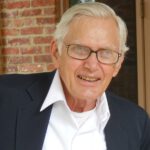I felt a call to the Christian ministry by the end of my Senior year in high school, and I was influenced at Wesleyan University by John Darr and Bill Spurrier, who were chaplains, led services, taught courses, and provided leadership in the Christian Association and the pre-ministerial club. Since I was intending to go on to seminary, they urged me not to major in religion, so I chose History. I was first introduced to the field of religious education by Paul Vieth at Yale Divinity School, but a course in Church History and a year overseas in the Netherlands at the University of Leiden on a Fulbright Scholarship caused me to think of a career in researching and teaching church history. This changed when I returned to YDS, took courses with Randy Miller and was turned on by his textbook, Education for Christian living. In several graduate seminars I met Sara Little and Will Kennedy, and our friendship and association continued for decades.
Randy Miller was brought to YDS because of his book, The Clue to Christian Education, which set forth the theological basis for the field. YDS had a strong tradition in the field going back to Charles Foster Kent and E. Hershey Sneath, who then brought Luther Weigle to Yale as the first Horace Bushnell Professor of Christian Nurture. Religious Education was seen as an inter-disciplinary field, including: biblical and theological foundations, philosophical inquiry, the psychological understanding of human growth and development, and the best pedagogical tools to help learning take place. The more liberal psychological-social theories developed by George Albert Coe and others had been challenged by Reinhold Niebuhr, and especially by Shelton Smith, and Randy Miller helped to re-formulate the field. He preached the sermon at my service of Ordination.
I saw myself as a Religious Educator, and I was helped and influenced by a number of wonderful mentors, organizations, studies and publications. In Illinois Robert Hotelling recruited me to chair the state youth committee of the Congregational Christian Churches and to give a series of talks at the large youth conference at Elmhurst College on “The Cost and Joy of Discipleship.” Gerry Fahrenholz and Ray Giffin in Minnesota recruited me to give leadership training courses and introduce the new curriculum of the United Church of Christ. This continued in Massachusetts, where I was associated with Horace Seldon and met John Westerhoff.
I attended my first Religious Education Association convention in Chicago in 1956, and have been a member ever since, receiving the journal, Religious Education, and serving as secretary-treasurer of the Boston chapter. I also attended the annual mid-winter meetings of the Division of Christian Education of the National Council of Churches, where I worked with Gerry Knoff, Blaine Fister, and many others.
Further graduate study was done at the University of Connecticut in the field of Child Development and Family Relations, where I was introduced to the developmental psychologist Jean Piaget. I was also in the graduate program at New York University, where I took courses with Norma Thompson, Gabriel Moran and others. Randy Miller came down to NYU one summer to teach a course on process theology and religious education, and I read extensively on the philosophy of Alfred North Whitehead and its implications for religious education.
1970 represented a major turning point in my life, since I was called as general secretary of the Religious Education Association and worked closely with my professor, mentor and friend Randy Miller. Through the R.E.A.’s research committee we gave Lilly Fellowships to Bob O’Gorman, Allen Moore, Church Melchert, James Michael Lee and others. Major projects at the R.E.A. included the formation of the National Council on Religion and Public Education, the editing of the festschrift, Pioneers of Religious Education in the 20th Century, and the Faith Development in the Adult Life Cycle Project. When Randy retired as editor of the journal in 1978, I recruited John Westerhoff as the new editor.
Since leaving the R.E.A. post, I have worked for 25 years as archivist of the R.E.A., the Association of Professors and Researchers in Religious Education, and the NCRPE, and the archives became a part of the special collections at Yale Divinity School library. I have also written three entries for the Christian Educators of the 20th Century project on Edna May Baxter, Luther Weigle and Hugh Hartshorne. As Yale Divinity School approaches its 200th anniversary in 2022, I am planning a book on Yale and Religious Education, and have already written chapters on Horace Bushnell and on “Laying the foundations of Religious Education at Yale.”
